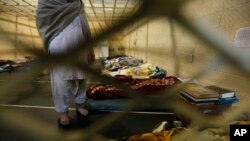The fate of nine Pakistani detainees who were held at a U.S. military prison in Afghanistan is a source of friction between Islamabad and Kabul. Afghan authorities say the men are dangerous terrorists who threaten the region, and they oppose Washington’s transfer of them to Pakistani custody.
As part of its military withdrawal from Afghanistan, the United States has stepped up efforts of winding down its so-called Bagram detention center north of Kabul.
There are about 29 non-Afghans being held at the facility, with a majority of them said to be of Pakistanis. They are the only detainees remaining in U.S. custody after shifting hundreds of Afghan prisoners to the Kabul government.
Since November 2013, the U.S. military has turned over 25 detainees to Pakistan, including nine men repatriated last week. That release has triggered strong Afghan criticism, even though Washington says Kabul was informed before it took place.
Afghan Interior Ministry spokesman Sediq Sediqi has insisted his country is seeking clarifications from the United States, because he has said the prisoners have ties to the Haqqani network and al-Qaida operatives based in Pakistan.
He said the Pakistanis who were arrested by American forces, "are really dangerous people who posed a threat in the past and they are a threat today.” Sediqi claims the freed men are rejoining their terrorist networks operating in Pakistan and will be ready to conduct revenge attacks against the people of Afghanistan.
'Security assurances'
The U.S. Department of Defense said the nine detainees were transferred to Pakistani custody with appropriate security assurances, including criminal investigations.
Pakistani officials maintain that returned detainees are kept under surveillance to make sure they have no links to militant outfits.
The Pakistani prime minister’s adviser on national security and foreign affairs, Sartaj Aziz, says Afghan authorities have mistaken concerns about the release of detainees. He told VOA the most important task for both countries is to work together jointly to secure their porous border and prevent extremists crossing in either direction.
Regarding the detainees released last week from the Bagram detention center, Aziz questions why they are considered a security threat to Afghanistan.
“They have already arrived in Pakistan," he noted. "So, I think that is not the issue. But basically, there is turmoil in the border [area] and obviously some of [the Pakistani detainees]” have been involved.
Aziz told VOA the problem is one that both nations must confront.
“it is a problem that is a common problem for both Afghanistan and Pakistan and I hope we can jointly solve it.”
The non-governmental organization Justice Project Pakistan is pursing litigation in Pakistani courts on behalf of detainees repatriated from U.S. custody.
Its legal director, Maryam Haq, said Pakistani authorities keep detainees for some time in secret prisons after they return from Afghanistan.
“The ones that have come back, right now, they are currently being detained. Their location is undisclosed and they are incommunicado detention because their families have not been informed by the government nor have their lawyers nor have the courts,” said Haq.
Haq dismissed Afghan accusations that Pakistanis recently released from U.S. custody are dangerous militants or that they are rejoining the ranks of terrorist networks.
She said some of them are above the age of 60, while some are “mentally unhealthy” according to their legal history. Haq added that her organization also is working to reintegrate these individuals with their families.
“These Pakistani prisoners have been in Bagram for up to 10 years in some cases. When they are released to Pakistan they are subjected to further investigation," she said. "So, if in the years that the U.S. and Pakistan continue to detain these people, and at the end of that period they have not been able to find anything on them to even charge them or try them in a court of law, then who can speak to what it is on the bases of which they have been held in the first place.”
Detainee plan
NATO forces commander in Afghanistan U.S. General Joseph Dunford assured Congress last month that Pakistani detainees at Bagram are being transferred after each individual's case is investigated to ensure they do not pose threats to U.S. interests.
“The challenge with this issue is that our authority to hold these individuals will expire on 31 December of 2014. So, we are working very hard now to ensure that we properly transition these individuals to a place where they can be held accountable for the acts that they have committed,” he said.
Haq said there are at least 15 Pakistanis detained at Bagram and her organization is pressuring the Pakistani government to intensify efforts to bring them home before the U.S.-led military mission in Afghanistan ceases by end of this year.
Dunford told Congress there is no plan to turn non-Afghan prisoners over to Afghanistan.
“We are planing to turn them to the countries from which they originated. My sense is that if we would have turned them over to Afghanistan today, I could not guarantee that they would be properly handled,” he said.
This is not the first time prisoner releases have drawn controversy among the three governments. Earlier this year, Afghan President Hamid Karzai released 65 Afghan prisoners, despite repeated U.S. warnings the men were dangerous criminals.
The president said the men had been cleared for release by Afghan judicial authorities.













